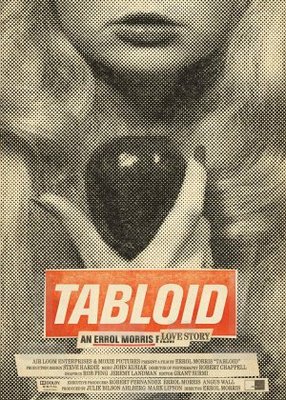 Tabloid
Directed by: Errol Morris
Cast: Joyce McKinney
Running Time: 1 hr 28 mins
Rating: R
Release Date: July 15, 2011 (Chicago)
Tabloid
Directed by: Errol Morris
Cast: Joyce McKinney
Running Time: 1 hr 28 mins
Rating: R
Release Date: July 15, 2011 (Chicago)
PLOT: A documentary about Joyce McKinney, a "regular" American girl who was made into a British tabloid sensation when she "abducted" her Mormon boyfriend in England and chained him to a bed for three days.
WHO'S IT FOR? Morris has created a following with his acclaimed documentaries, but fans might find this to be one of his more disappointing documentaries (especially if they're looking for something more cinematic like The Thin Blue Line).
OVERALL
Diving into this project, Morris had limited resources. The man tied up and romanced by McKinney, Kirk, declined an interview. ”KJ,” The other potential co-star to Morris’ stranger than fiction freak show, died in the mid 2000’s of kidney failure. On top of this, a lot of photos collected by tabloid men and the clips collected by McKinney herself had vanished in time, or had been destroyed in one way or the other.
Because of the saga of Joyce McKinney is filled with curiosities, Morris is able to keep his audience occupied with his limited number of six talking heads as they tell the story. One could argue this wouldn’t be the case if the tale wasn’t taboo topic packed, and if Joyce’s performance weren’t Oscar-worthy in some other fictional dimension.
Morris’ second greatest assistance to his audience is his multitude of newspaper clippings. He certainly finds a way to hype up his story’s tabloid friendly aspects, giving promiscuous photos (even if they’re not of Joyce) a prominent appearance throughout. Missing the mark on the falsity of tabloid material, he throws a book of tabloid headlines at his audience, so much that we eventually start to have our inner lie detectors malfunction. Tabloid is meant to feature a mysterious element in its story, but he aggressively plays into the possibly fake aspects of it. He likes stirring the confrontation pot with no resolve. And for some other reason, Morris likes withholding the American perspective on all of these events.
Tabloid’s ugliest visual aspect is all of the junk that Morris copies and pastes into the story, which often comes off as cheaply snide. Not only is the usage of 50’s-era imagery overwrought, it’s out of place in this story that happens during the 70's and 80's. Morris uses footage from films like Brief Encounter as if he were a tenth-grader trying to take up space on a history paper with some Microsoft Word clip-art. His most compelling visual grab is of a Mormon cartoon, but we have little idea as to where it came from or what relevance it has to the entirety of that religion.
As a storyteller, he is unfortunately not able to maintain our trust with how he treats his tale. As Joyce tells her story, Morris begins to show a progressively obvious distaste for his subject, eventually editing her into a self-satire. When she mispronounces the word “phenomenon,” he cuts to black, as if it were a punch line. As Joyce tries to describe a mini-bar but fails to use that word in her description, he flashes “MINI-BAR” on the screen. As "barking mad" as Joyce McKinney may be, Morris shows a near equal amount of immaturity.
Tabloid is a lesson in how all documentaries still need diligent filmmaking to prevail, regardless of however provocative their story may be. Relying heavily on talking heads to make his film, Morris thinks he can let his sensationalized story tell itself, and that his visual requirements are low. If he feels like he wants to contribute something, he can, and it can be whatever he feels is right.
This isn't a documentary, but a visual Wikipedia page.
FINAL SCORE: 5/10
